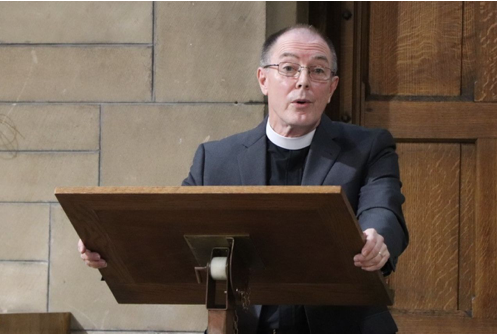Discipleship and learning
The Reverend Dr Michael Hull writes:
Jesus is a teacher. Jesus is called a didaskalos in the Gospels, the Greek word for a teacher. Jesus calls himself a teacher (Matthew 26.18). Jesus preached in synagogues (Luke 4.15); Jesus debated with religious leaders of his day, like the Pharisees and Sadducees (Mark 12.13–34); and Jesus taught crowds (Mark 3.7–8). Jesus commanded his disciples to make disciples of all the nations and spread his teaching to the ends of the earth (Matthew 28.19–20). Learning is essential for discipleship, and learning is a gift to share with others.
During his time on earth, Jesus was keen to gather groups of disciples for special instruction. For example, St Mark tell us that Jesus called a group whom he named ‘apostles’ to be with him and to whom he would grant authority (3.13–19). St Luke tells us that as the apostles followed Jesus through cities and villages in proclaiming the Good News, Mary Magdalene, Joanna, Susanna and others widened the ever-expanding group of disciples (8.1–3). They were, no doubt, learning from Jesus’s own words and deeds in peripatetic fashion.
It is noteworthy that the apex and nadir of Jesus’s earliest disciples are couched in addressing him as a teacher. St John describes Mary Magdalene as in tears outside Jesus’s tomb. She sees Jesus, but the shock of the Resurrection leaves her confused. Jesus calls her by name, ‘Mary’. Mary says ‘Rabbouni!’ (Aramaic for teacher). It is breath-taking to see that Mary’s relationship with Jesus is exemplified by his role as teacher. Mary is a disciple who knows Jesus’s voice: ‘My sheep hear my voice, and I know them, and they follow me’ (John 10.27). On the other hand, St Matthew tells us that Judas refers to Jesus as rabbi (Hebrew for teacher) at the Last Supper and when he betrays Jesus with a kiss (26.25, 49). Judas’s use of the title in juxtaposition to Mary’s is chilling. Jesus’s voice is unheard as Judas raises his own in fulfilment of Jesus’s prophecy that the shepherd will be struck (Mark 14.27; Zechariah 13.7). Learning is no guarantee of faithful discipleship as per Judas, but it is hard to envision Mary’s faithfulness other than with the words and deed of Jesus the Teacher.
Each of us is called to learn in virtue of our Christian discipleship. Yet, two thousand years after Jesus’s days on earth we find ourselves overwhelmed by the cacophony of voices that vies for our attention. If discipleship is a matter for every Christian, then learning is a matter for each disciple. But where do we start? We start where Mary Magdalene started, with Jesus. We encounter his words and deeds in the Gospels. St Jerome sagely notes: ‘Ignorance of the Scriptures is ignorance of Christ’. Anyone in our day who wishes to be a Christian disciple must be a student of the Gospels because it is in them that we encounter the Jesus who demands a choice from us, as C. S. Lewis observes in Mere Christianity, that is to accept or reject Jesus’s extraordinary claim to be God, not just a great human teacher, but the One at whose name every knee must bend, upon whose every word we must hang and to whose deeds we must credit Atonement.
In the first instance, we must study the Gospels and the whole of the Bible. That is how we will know him and learn to follow him. We will find him, as those early disciples on the Emmaus Road did, in the Eucharist, in the breaking of the bread (Luke 24.13–35). We will find him in the teaching of the apostles, communal life and prayer (Acts 2.42–47). Thus, it behoves the Christian Church to offer opportunities for the whole of God’s people, not just the clergy or those in ministerial roles, to learn about Jesus: to study the Bible, the prophets and the apostles, the life of the Christian community and the discipline of prayer. The Scottish Episcopal Church takes this responsibility seriously and offers opportunities for lay learning through the Scottish Episcopal Institute, especially through its short courses, Journal and annual lectures.
Learning does not make the disciple, for discipleship is about being and doing, but learning certainly informs discipleship. In our very troubled world, we may be tempted to think we should busy ourselves only with doing, but that itself would be a failure to learn from the Lord. Remember what happened when Jesus visited the home of Martha and Mary? Jesus reminded Martha, and he reminds us today, that it is good to sit at his feet and listen (Luke 10.38–42). There are many ways to do that, to be sure, one of which is to join with the Scottish Episcopal Institute as you are able.

